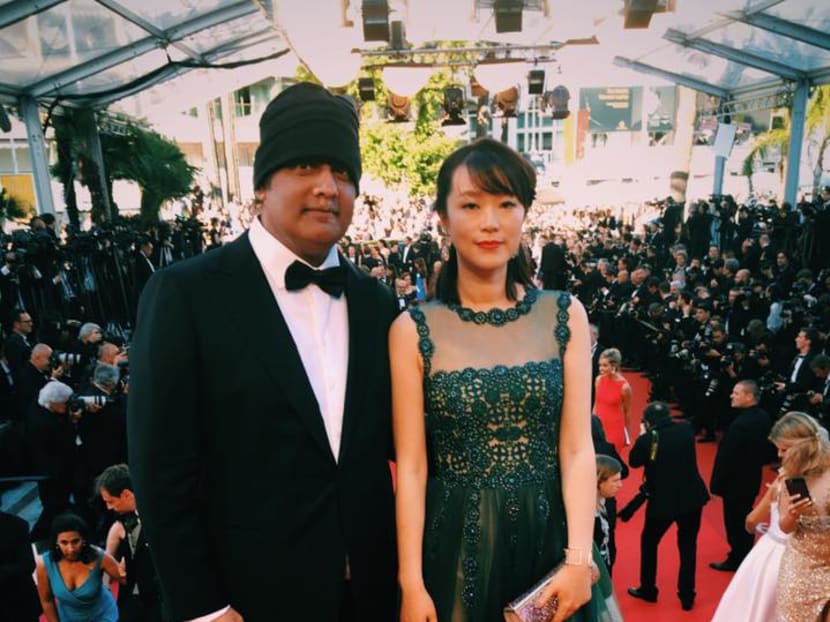Meet the ‘Other’ voice in K Rajagopal’s A Yellow Bird
SINGAPORE — For his maiden feature film, Singaporean film-maker K Rajagopal decided to focus on something he felt strongly about — giving a voice to minorities. Inspired by novels such as Albert Camus’ The Stranger and Fyodor Dostoevsky’s Crime And Punishment, Rajagopal said he wanted to highlight the “other” in Singapore society, or “the average minority Indian person we meet in our everyday life but (is) living on the edge of life”.

A Yellow Bird's director, K Rajagopal (left) with the film's actress Huang Lu, at the red carpet of Cannes Film Festival. Photo: A Yellow Bird's Facebook page
SINGAPORE — For his maiden feature film, Singaporean film-maker K Rajagopal decided to focus on something he felt strongly about — giving a voice to minorities.
Inspired by novels such as Albert Camus’ The Stranger and Fyodor Dostoevsky’s Crime And Punishment, Rajagopal said he wanted to highlight the “other” in Singapore society, or “the average minority Indian person we meet in our everyday life but (is) living on the edge of life”.
That passion has paid off. His film A Yellow Bird is screening on Wednesday (May 18) and Thursday at International Critics’ Week, a parallel section to the ongoing Cannes Film Festival. It is also in the running for the Camera d’Or award for best feature film debut, an award that fellow Singaporean Anthony Chen picked up for his film, Ilo Ilo, in 2013. Rajagopal’s film is a co-production between Singapore and France that took three years to get off the ground.
Rajagopal told TODAY: “We do not live in a homogenous society but a multicultural one, and oftentimes, the voice of the minority goes unheard or gets lost ... I wanted to present an extreme situation in order to see the consequences of that particular individual’s life in a civic society.”
That “extreme situation” he refers to is of his movie’s protagonist Siva, a 38-year-old Indian Singaporean man who is released from prison after eight years for smuggling contraband. The reality of his release is a dismal one for the former convict — his mother is unable to forgive him, and his wife and daughter have left him. He later finds solace in the company of an illegal Chinese worker, Chen Chen.
Rajagopal is no stranger to nabbing awards. He won the Singapore International Film Festival’s (SGIFF) Special Jury Prize for three consecutive years with his short films I Can’t Sleep Tonight (1995), The Glare (1996) and Absence (1997).
Still, he admitted he feels pressured by the fact that there are expectations for A Yellow Bird to succeed in the competition. But it’s a good type of pressure, he noted. “I am proud of the film, and the selection to the Cannes Festival is really encouraging for a first feature film.”
While winning would give the film bigger opportunities to be at other prestigious festivals and enable it to reach different audiences and make international distribution easier, Rajagopal said he wouldn’t be affected too much if it didn’t win. Being at Cannes, “has already created new prospects for the team”.
He also hopes to be able to bring his film back to SGIFF, which is part of the stable of events under Singapore Media Festival (SMF), which takes place in November.
Seeing as how the SMF aims to identify and nurture the next generation of storytellers in the region, how does Rajagopal feel about the state of Singapore’s film industry?
The 51-year-old said while the industry is seeing more development and there are attempts to create a better and more conducive environment for young film-makers, “it will take some time to build a full-fledged industry as of now”.
“There are many challenges facing Singapore films ... I think we need to keep working on producing better film scripts which appeal to local audiences,” he pointed out. “There is also a need for better production values, and for actors to keep training so as to remain competitive in their field and achieve higher standards of performance.”
At the end of the day, a stellar picture is one that plays out exactly as it should, involving teamwork between all players, he said. “To me, a good film needs all the elements like acting, screenplay, art design, music and sound design to work hand-in-hand to tell the story in an honest and effective way, as how the film-maker envisioned it.”





